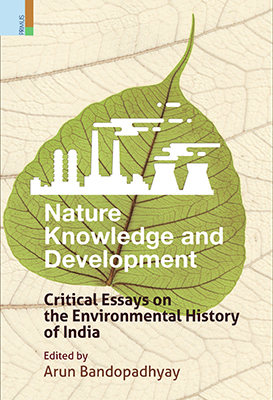
Nature, Knowledge and Development: Critical Essays on the Environmental History of India
EDITOR : Arun Bandopadhyay
| HB ₹ 1395 . $ 59.95 . £ 44.95 |
e-Book ₹ 1245 . $ 53.95 . ₤ 39.95 |
|
INFORMATION
- EDITOR : Arun Bandopadhyay
- HB ISBN : 978-93-84082-61-1
- EBOOK ISBN : 978-93-84092-16-0
- Year : 2016
- Extent : 190 pp.
- Discount available on checkout
- Usually dispatched within 3 to 5 working days.
Tagore
| HB ₹ 995 . $ . ₤ |
PB ₹ . $ . ₤ |
|
| POD ₹ . $ . ₤ |
e-Book ₹ . $ . ₤ |
INFORMATION
- AUTHOR –
- ISBN – 978-93-84082-78-9
- Year – 2016
- Extent: 400 + 40 coloured illustrations
- 10% discount + free shipping
- Usually dispatched within 3 to 5 working days.
This volume delves deeply into historical research to exemplify theoretical claims of historical meta-narratives and to explain the present predicament of environmentalism. The consequences of colonialism, industrialization, and capitalist interventions in the environment have brought the colonized regions of South Asia into intense global focus and made environmental history a field of great importance. Accordingly, the essays herein highlight the importance of comparative studies within the field of environmental history. From the legacy of colonial forest policies to contemporary watershed programmes, they address several of India’s more prominent environmental history issues, placing them within the comparative frameworks of time, region, society and culture.
The Editor
Arun Bandopadhyay is currently visiting Professor at the University of Calcutta, and Editor of The Calcutta Historical Journal. Earlier, he was Nurul Hasan Professor of History and Dean of Faculty Council for Postgraduate Studies in Arts, University of Calcutta. His most recent publications include History of Gun and Shell Factory, Cossipore: Two Hundred Years of Ordnance Factories Production in India (2002); Tribes, Forest and Social Formation in Indian History (2004); and Science and Society in Indian History, c. 1750-2000 (2010). He is also series co-editor, with Amiya Kumar Bagchi, of Documents on the Economic History of the British rule in India, 1858 – 1947.
As a global figure, Tagore transcends the boundaries of language and reaches out to people distant both in time and space. His art took inspiration from contemporary Western trends and became a powerful means to connect with people beyond Bengal. Word, image, song, and text were his tools of communication, as also his extraordinary presence in a sartorial garb of his own design. A littérateur in many genres, the impact of his work was determined both by the material he presented, and by its simultaneously local and global contexts. Now, when his international reputation has spanned over more than a hundred years, it is important to revisit the sites of Tagore’s eminence, and ask to what extent he was a ‘living text’ in the century that witnessed him as a global intellectual.
Accordingly, this volume investigates how Tagore’s writings and art are linked to the metalinguistic domains of the psychological, medical and mythical; how he was received in various cultures outside India; how his art was determined by individual circumstances and global aspirations; and how he acted as an inspiration to his contemporaries and subsequent generations including modern Indian writers and artists.
The Editor
Imre Bangha studied in Budapest and Santiniketan and at present is Associate Professor of Hindi at the University of Oxford. He has published books and essays in English, Hindi, and Hungarian on literature in Brajbhasha and other forms of old Hindi and has also prepared Hungarian translations from various South Asian languages. His work on the international reception of Bengali culture includes Rabindranath Tagore: Hundred Years of Global Reception (2014, co-edited with M. Kämpchen) and Hungry Tiger: Encounter between India and Central Europe (2007).
Table of Contents
Table of Contents
| Preface | Ix-X |
| Introduction – Arun Bandopadhyay | 1-6 |
| Modern Science: An Ecological Critique, Tapan Kumar Chattopadhyay | 7-24 |
| Deep Ecology And Some Ancient Indian Texts: An Overview,Priyambada Sarkar | 25-40 |
| The Colonial Legacy Of Forest Policies In India , Arun Bandopadhyay | 41-64 |
| Environment And Social History: Kalahandi, 1800–1950, Biswamoy Pati | 65-80 |
| Accessing Nature: Agrarian Change, Forest Laws And Their Impact On An Adivasi Economy In Colonial India, Sanjukta Das Gupta | 81-108 |
| Famine In A Forest Tract: Ecological Change And The Causes Of The 1897 Famine In Chota Nagpur, Northern India , Vinita Damodaran | 109-142 |
| Marginal Groups And Watershed Programmes In Contemporary South India: The Case Study Of Andhra Pradesh, Raj Sekhar Basu | 143-166 |
| Bibliography | 167-178 |
| About The Editor And Contributors | 179-180 |
| Index | 181-188 |




